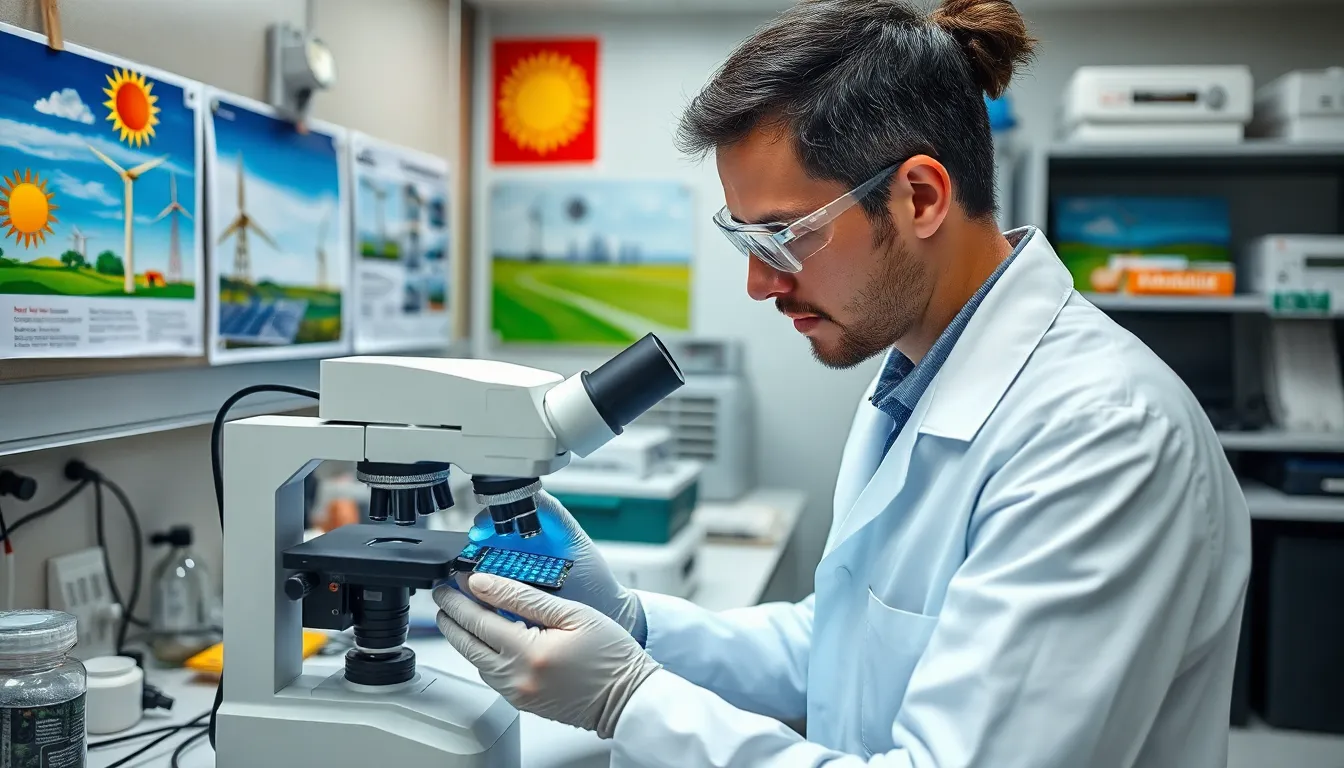As the world grapples with climate change and dwindling fossil fuel reserves, renewable energy research has emerged as a beacon of hope. Scientists and engineers are tirelessly exploring innovative solutions to harness the power of nature, from solar and wind to geothermal and hydroelectric energy. This exploration not only aims to reduce greenhouse gas emissions but also seeks to create a sustainable energy future.
With advancements in technology and growing investments, the renewable energy sector is evolving rapidly. Breakthroughs in energy storage, efficiency, and grid integration promise to transform how energy is produced and consumed. As researchers delve deeper into these possibilities, the potential for a cleaner, greener planet becomes increasingly attainable.
Table of Contents
ToggleOverview of Renewable Energy Research
Renewable energy research focuses on innovative methods to harness natural energy sources. Scientists and engineers investigate solar, wind, geothermal, and hydroelectric power to develop practical, efficient solutions. Research in these areas aims to minimize reliance on fossil fuels and significantly reduce greenhouse gas emissions.
Solar energy research explores advancements in photovoltaic cells, increasing their efficiency and accessibility. Wind energy research studies turbine design and placement to optimize energy capture, specifically in areas with high wind potential. Geothermal research examines subsurface temperature variability to enhance energy extraction methods. Hydroelectric research aims to improve dam efficiency and explore micro-hydropower systems.
Energy storage remains a critical area of investigation. Researchers work on battery technologies, such as lithium-ion and solid-state batteries, ensuring energy availability when production fluctuates. Integration with the power grid is essential; researchers find ways to implement smart grid technologies that facilitate the use of renewable energy sources.
Funding for renewable energy research has grown, with both governmental and private sector investments increasing by approximately 25% from 2020 to 2022, indicating a commitment to sustainable energy innovation. As technology progresses, renewable energy research continues to evolve, pushing boundaries towards a cleaner and more sustainable future.
Key Areas of Focus

Renewable energy research is concentrating on several innovative technologies pivotal for a sustainable energy future. The following areas represent significant advancements and ongoing developments.
Solar Energy Innovations
Solar energy research emphasizes improving photovoltaic cells’ efficiency and reducing production costs. Current efforts focus on multi-junction solar cells, which significantly enhance energy conversion rates by capturing a broader spectrum of sunlight. Research into perovskite materials aims to lower manufacturing expenses while maintaining high efficiency. Additionally, developments in solar tracking technology optimize energy collection, allowing systems to adapt to the sun’s position throughout the day. Battery storage solutions, such as lithium-ion and emerging solid-state variants, play a critical role in storing solar energy for use during non-sunny periods, ensuring a reliable supply.
Wind Energy Developments
Wind energy research prioritizes turbine design and performance optimization to increase energy production. Innovations include larger rotor diameters and advanced blade designs, improving efficiency in various wind conditions. Enhancements in materials science contribute to lighter, stronger turbine components, allowing for taller structures that capture more wind. Offshore wind farms are gaining attention due to their potential for higher and more consistent wind speeds, prompting advances in floating turbine technologies. Integration with energy storage systems facilitates the management of variability in wind energy output, ensuring a balanced energy supply.
Biomass and Bioenergy Advances
Biomass and bioenergy research is focused on increasing feedstock conversion efficiency and developing sustainable cultivation practices. Recent advancements in genetic engineering target energy crops for higher yields and reduced resource dependency. Additionally, innovations in anaerobic digestion technology enhance biogas production from organic waste, contributing to cleaner energy generation. Research into algae biofuel continues to progress, emphasizing cultivation techniques and cost-effective processing methods. These developments position biomass as a critical component of a diversified renewable energy portfolio, contributing to energy security and climate goals.
Challenges in Renewable Energy Research
Renewable energy research faces multiple challenges that can hinder progress toward a sustainable energy future. These challenges include technological barriers and economic considerations.
Technological Barriers
Technological barriers significantly impact the advancement of renewable energy solutions. These barriers include:
- Energy Storage Limitations: Current battery technologies often struggle to store large amounts of energy efficiently. Innovations in solid-state and flow batteries are critical for overcoming these limitations.
- Grid Integration Issues: Integrating renewable sources into existing energy grids poses technical complications. Smart grid technology is vital for enhancing grid resilience and managing variable energy production.
- Efficiency Gaps: Many renewable technologies, like photovoltaic cells, have not reached optimal efficiency levels. Ongoing research aims to develop materials and designs that maximize energy conversion rates.
- Maintenance and Reliability: Some renewable systems, particularly offshore wind turbines, face challenges related to maintenance and reliability. Designing robust systems that withstand harsh conditions is essential for long-term sustainability.
- Resource Variability: Renewable energy sources depend on environmental conditions, leading to fluctuations in energy availability. Innovations in hybrid systems may mitigate these challenges by combining multiple energy sources.
Economic Considerations
- Funding Accessibility: Securing financial support for research and development is often challenging. Continued investment from governmental and private sectors is necessary to drive innovation.
- Cost-Effectiveness: Despite advancements, renewable technologies can remain more expensive than traditional fossil fuels. Research aimed at reducing production costs and improving scalability is vital for market competitiveness.
- Market Uncertainty: Fluctuating policy environments and regulatory frameworks impact investor confidence in renewable energy projects. Stable policies provide the necessary framework for long-term investment and growth.
- Job Market Shifts: The transition to renewable energy creates new job opportunities while rendering some fossil fuel jobs obsolete. Workforce training programs addressing these shifts are crucial for a smooth transition.
- Infrastructure Investments: Upgrading infrastructure to support renewable energy systems demands significant upfront costs. Coordinated efforts between governments and industries can streamline these investments and enhance overall energy efficiency.
Future Trends in Renewable Energy Research
Future trends in renewable energy research indicate a strong shift toward innovative technologies and supportive policies aimed at optimizing energy solutions.
Emerging Technologies
Emerging technologies play a crucial role in shaping the future of renewable energy. Advancements in bifacial solar panels increase energy capture by utilizing sunlight reflected from surfaces. Floating wind turbines capture higher wind speeds offshore, enhancing energy output. Hydrogen fuel production through renewable sources, including electrolysis, demonstrates potential for clean storage and transportation of energy. Advanced geothermal systems are under development to harness resources from deeper Earth layers, significantly expanding geothermal energy capacity. Additionally, improvements in energy management software enhance grid efficiency and reliability, coordinating various renewable sources for optimal usage.
Policy and Regulation Impacts
Policy and regulation impacts influence the trajectory of renewable energy research. Governments worldwide are enacting policies that promote investment in renewable technologies, such as tax incentives and grants for innovative projects. Regulatory frameworks encourage the adoption of net metering, allowing consumers to receive credit for excess energy generated. Renewable energy standards drive utilities to diversify their energy portfolios, increasing the share of clean energy in their systems. Furthermore, international agreements, like the Paris Accord, foster global cooperation on emissions reduction, leading to strategic research initiatives aimed at renewable energy advancements. As regulations evolve, they will shape the landscape of renewable energy, ensuring alignment with sustainability goals and technological innovations.
The future of renewable energy research holds immense promise. As technological advancements continue to emerge, the potential for cleaner energy solutions expands. Ongoing investment and innovation are crucial for overcoming existing challenges and ensuring a sustainable energy landscape.
With a focus on efficiency and integration, researchers are paving the way for a greener planet. The collaboration between governments, private sectors, and scientists will be vital in driving these efforts forward. Embracing these developments can lead to significant progress in combating climate change and securing a stable energy future for generations to come.



